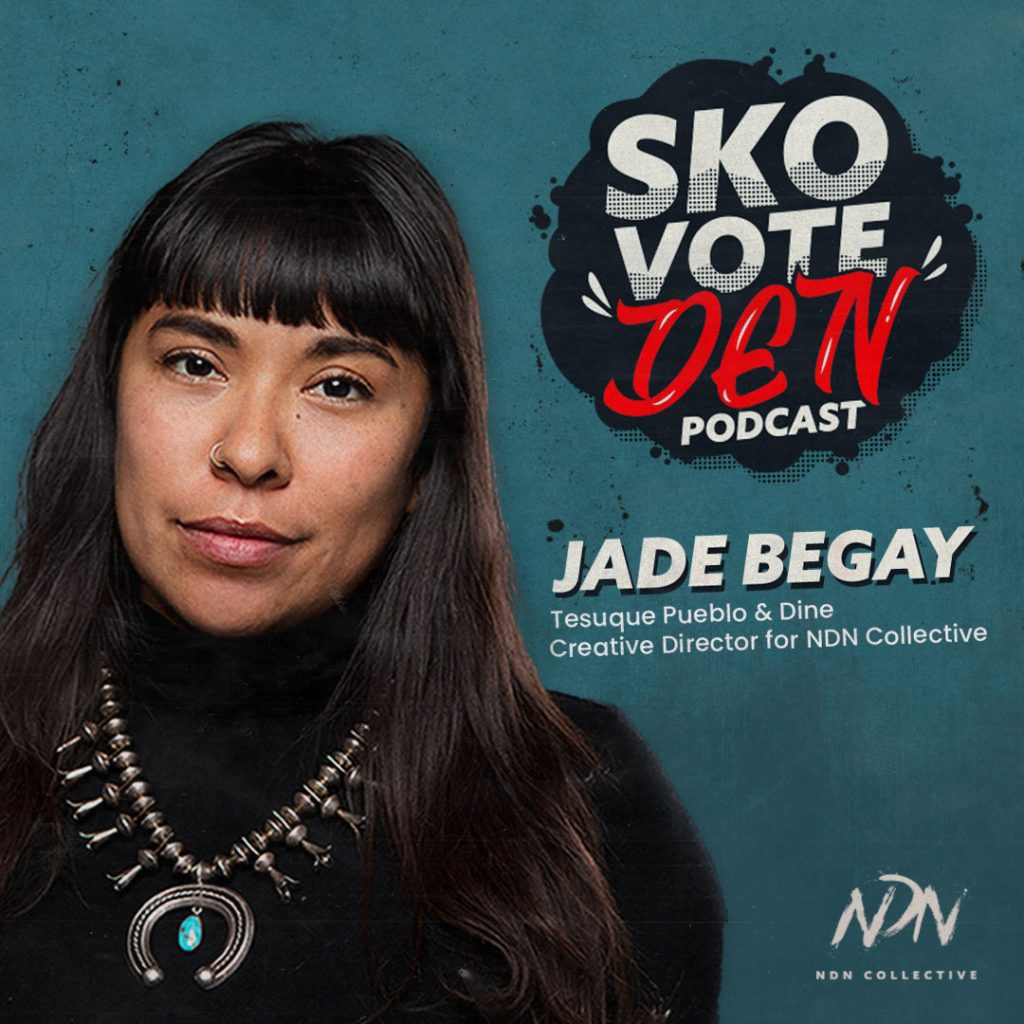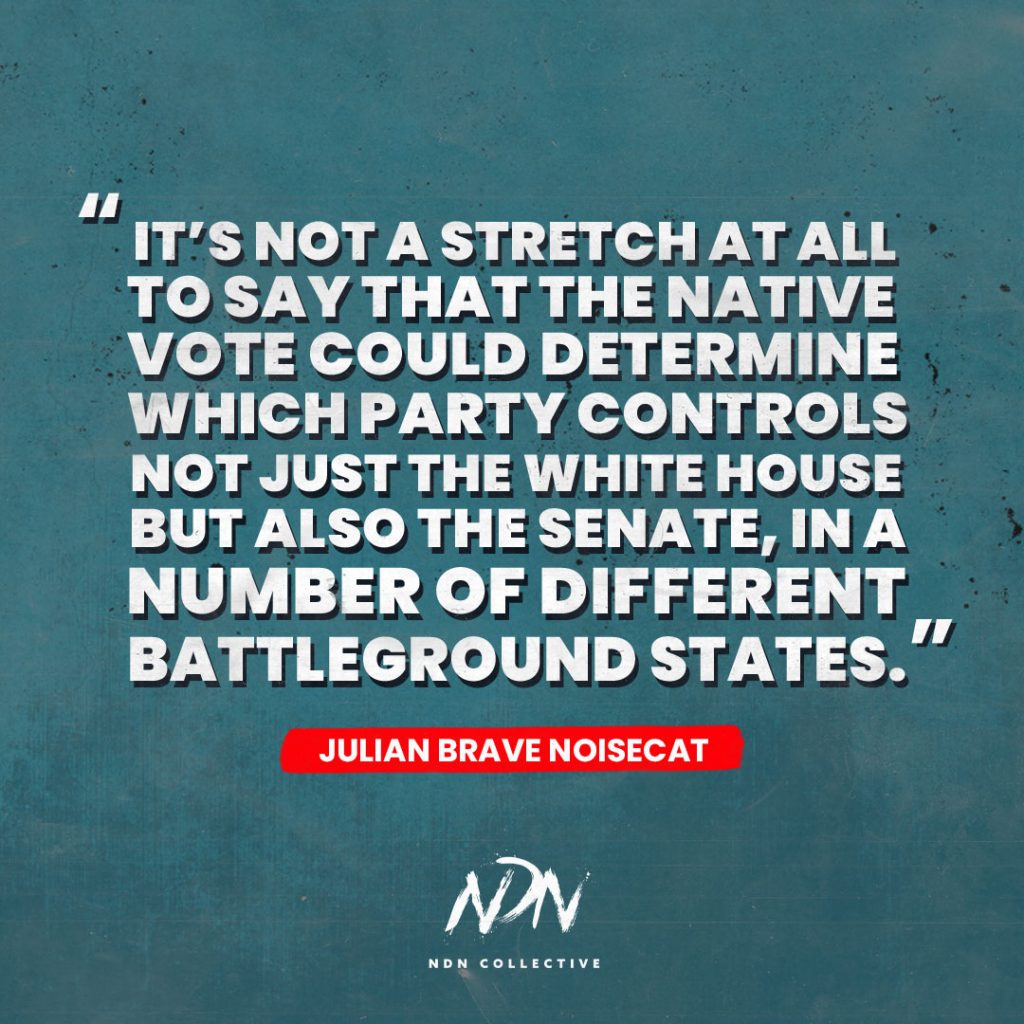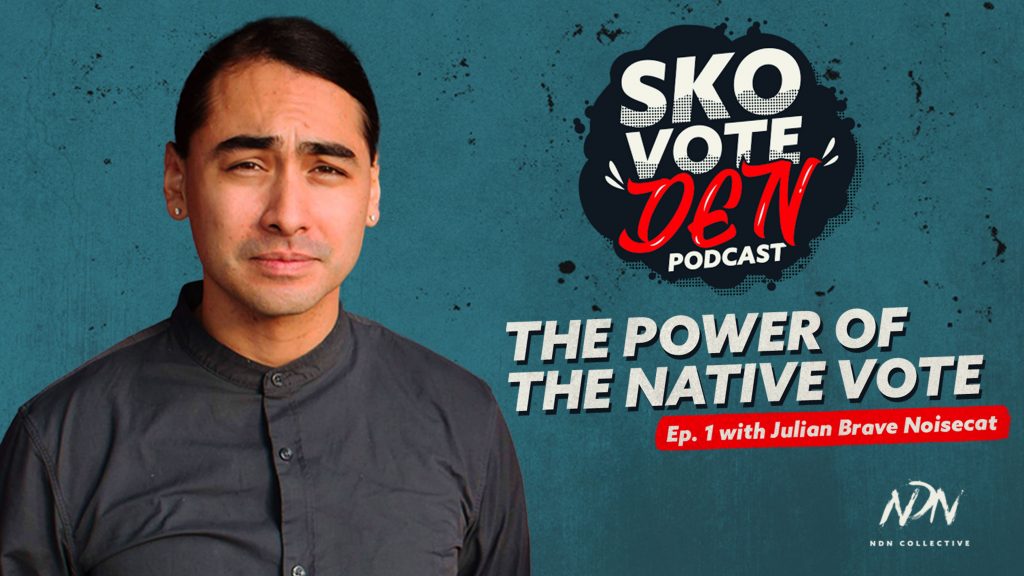Here at NDN Collective, we believe that in order to see our decolonial, radical, and progressive futures come to fruition, voting has to be a part of our strategy.
That is why we have launched the Sko Vote Den Podcast, a mini-series about voting in NDN Country. We also know that voting is not a black-and-white issue in our communities. It is a sensitive subject because of the legacies of colonial violence that the Federal government has forced upon our people. We also know that to say “get out the vote” in NDN Country actually requires a lot of nuance.
By speaking with organizers, elders, journalists, and policy experts on the Sko Vote Den podcast, we hope to provide context on why voting in NDN Country is complex and talk about the unique barriers we face in voting. In addition to providing the historical and current background, we will share encouraging messages and information that empowers Native voters to get to the polls this November and to connect the dots between fighting for self-determination and voting.

Over the past few months we have heard the message, “vote as if your life depended on it,” and that sentiment really couldn’t be more true for Native peoples. Across the country, we are seeing our communities at the frontlines of dangerous and harmful policy, rhetoric, and systemic violence.
When it comes to the land and the climate, we are seeing the Arctic Refuge, homelands to the Gwichin, being opened for drilling, which would be catastrophic not just for the Gwich’in but for every person on Earth. We are also seeing plans to move forward extraction in the Southwest with uranium mining in Bears Ears and mining in the Boundary Waters of Minnesota, putting not just entire ecosystems at risk of devastation but also putting our cultural lifeways in harm’s way.
Voting is not a black-and-white issue in our communities. It is a sensitive subject because of the legacies of colonial violence that the Federal government has forced upon our people.
We’re also seeing the dismantling of the Environmental Protection Agency, which means more extraction and pollution and less regulation and accountability for industry. As Indigenous Peoples, we know the realities of extraction in our homelands. We know that environmental racism is a very real reality for our communities and simply put, the harmful impacts of extraction and the climate crisis will only worsen if we do not vote in elected candidates who will listen to our demands and work with us to protect sacred lands and territories.
When it comes to the health of our communities, COVID-19 proved one thing to be very true: that the denial and carelessness of the virus at the federal level created more suffering than ever necessary.

In places like Navajo Nation, our communities were hit the hardest because long-standing inequities in health care and infrasture did not prepare us for the pandemic. In places like South Dakota, tribal sovereignty has been violated by local government, as the Governor of South Dakota tried to punish tribes for protecting their communities. What’s more is the same Governor held a public event in the traditional lands of the Lakota in the lead up to the Fourth of July, during a time when infection rates were high, and encouraged participants to not wear masks. This was a clear act of carelessness and disrespect to local Indigenous Peoples who did not welcome the event in the first place.
Last but not least, when it comes to our right to protest the systems that are not working and being able to speak truth to power, or when it comes to taking a stand for our self-determination, we are seeing a growing effort to silence our people, Native and non-Native alike. From Mt. Rushmore, to Portland, to the U.S./Mexico Border, we are seeing our relatives, who are organizing and mobilizing for dignity and equity, met with militarized police violence.

We are seeing our leaders, like Nick Tilsen, NDN Collective President and CEO, charged with felonies for taking a stand on his traditional treaty lands. We are seeing no justice for those murdered by failing police systems. Rather, those who hold elected office are leaning into authoritarian behaviors and instigating division rather than working to build unity and common ground among citizens.
This is why we are committed to getting out the Native Vote . We are creating tools like the Sko Vote Den Podcast for our community members to learn about what is at stake and how we can take action to change the political system so that the circumstances are better in 2021 and beyond to build Indigenous power.
The Sko Vote Den Podcast includes voices like Julian Brave NoiseCat, Judith LeBlanc, Rebecca Nagle and so many more insightful and strong leaders. Please subscribe and listen on Apple Podcasts or Spotify and please help us in amplifying this project.

